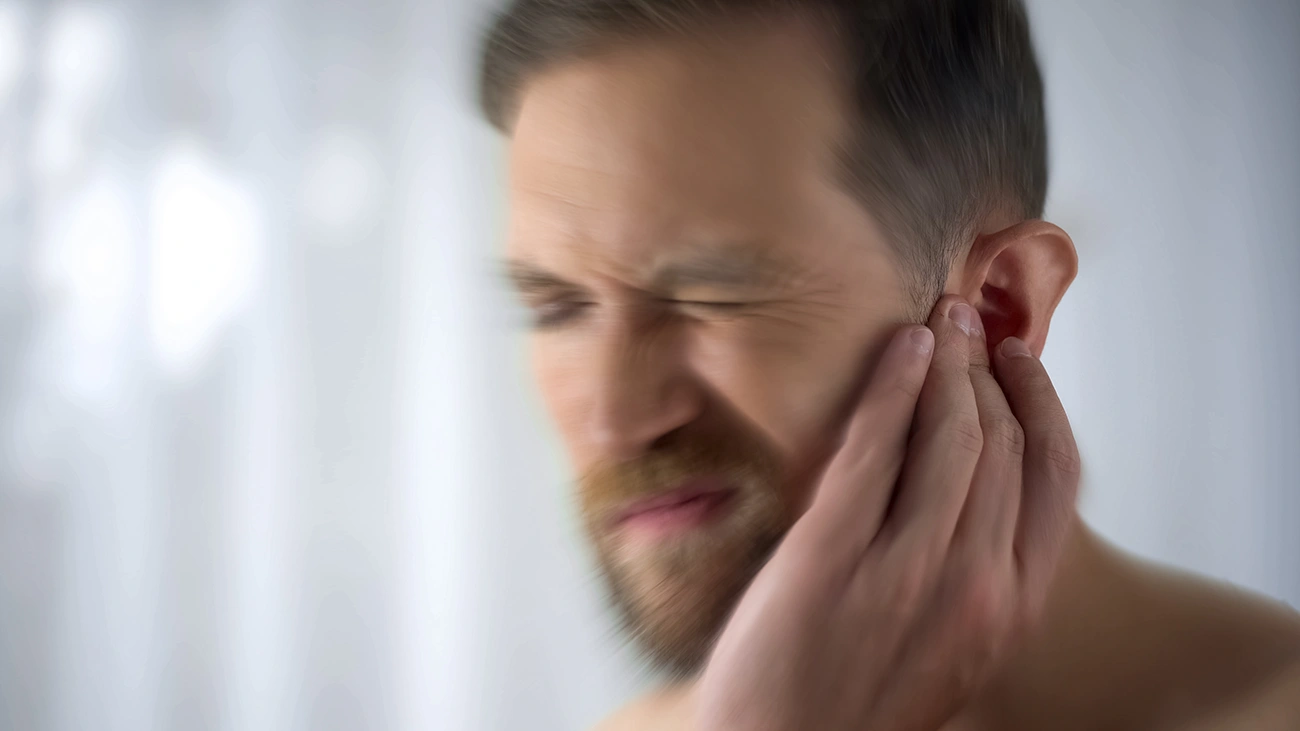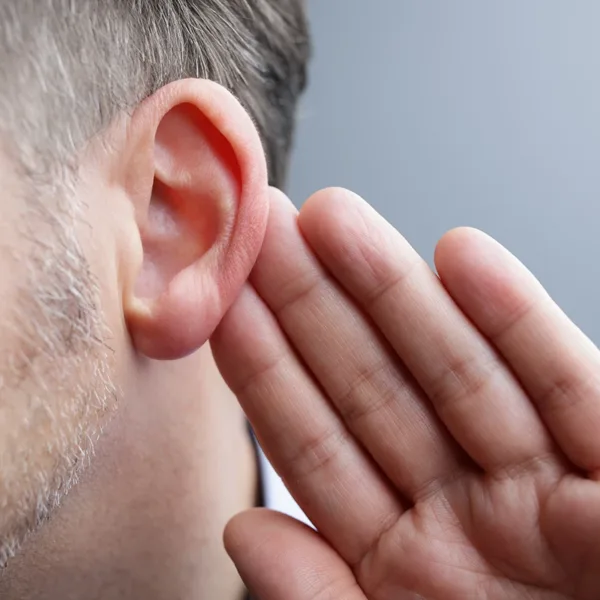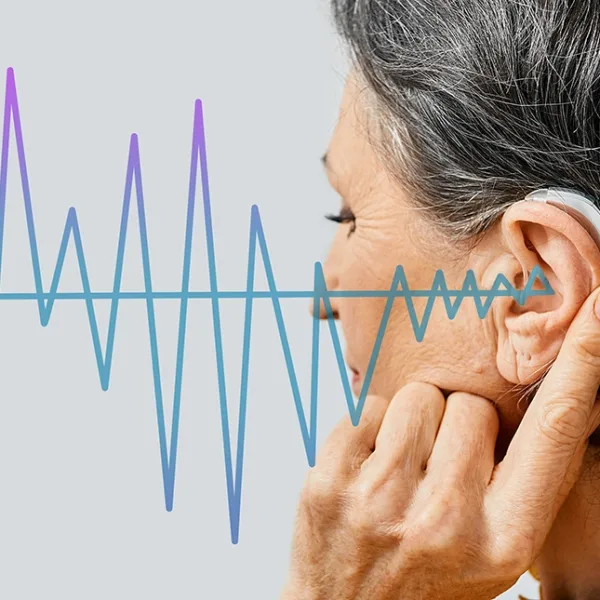
More than 50 million adults in the United States experience tinnitus, making it one of the most common health conditions in the country.1 Commonly referred to as “ringing in the ears,” tinnitus causes ringing, buzzing, or whooshing sounds in one or both ears.
In this guide, we provide a detailed overview of tinnitus, including common symptoms, what causes it, and various treatment options.
What Is Tinnitus?
Tinnitus is a common condition that causes you to hear sounds that don’t have an external source. These sounds may include ringing, buzzing, roaring, or other noises that can disrupt daily life significantly. For some people, the condition may come and go, while others can experience it chronically, meaning it lasts more than 3 months.
There are two main types of tinnitus:
- Subjective (most common): Only you can hear the sounds
- Objective (rare): A hearing specialist can hear the sounds through a stethoscope
Many cases of objective tinnitus, such as pulsatile tinnitus (more on that below), have an identifiable cause and can be treated with appropriate care. Subjective cases are often more complex and challenging to treat due to a wide range of potential causes.
Symptoms of Tinnitus
Although everyone experiences tinnitus differently, it typically involves hearing “phantom sounds” in one or both ears. Below are some examples of what it can sound like:
- Ringing
- Buzzing
- Humming
- Roaring
- Whistling
- Clicking
- Hissing
- Squealing
These sounds can vary in volume, pitch, and occurrence.
Causes of Tinnitus
Tinnitus itself is not a disease but rather a symptom of an underlying health condition. There are over 200 different health conditions that can contribute to tinnitus.2 Understanding the root cause is key to managing its effects.
Below is a list of some of the most reported causes:
Sensorineural Hearing Loss (SNHL)
Sensorineural hearing loss (SNHL) is the most common form of hearing loss, with over 66,000 people diagnosed in the U.S. each year.3 It is typically caused by damage to the auditory nerve or inner ear hair cells critical for sound processing. This damage can happen due to age, exposure to loud sounds, and even by taking certain medications (ototoxic medications).
When sound waves enter the ear, it causes these hairs to move around, which creates electrical signals that our brains interpret as sound. If these delicate hair cells get damaged, in addition to causing SNHL, they may also “leak” randomized electrical impulses that the brain interprets as tinnitus.
Conductive Hearing Loss (CHL)
Conductive hearing loss (CHL) happens when something prevents sound waves from reaching the inner ear. This could be blockages like earwax, or damage to the outer or middle ear. These blockages can cause pressure changes in your ear, leading to tinnitus.
Head or Neck Injury
Following an injury to the brain, head, or neck, it’s common for people to experience tinnitus as a temporary or lasting symptom. This is usually due to damage to the auditory nerve or inner ear, affecting how the brain processes sound. Tinnitus caused by an injury usually only occurs in one ear.
Blood Pressure Changes
Fluctuations in blood pressure can also lead to tinnitus. When blood vessels suddenly constrict (tighten) or dilate (open), it can make blood move too fast or irregularly through the vessels near your inner ear. This can create vibrations that your brain can interpret as pulsatile tinnitus. This is a form of objective tinnitus that presents as a rhythmic pulsing sound in time with your heartbeat.
Some common causes of blood pressure or circulation issues linked to tinnitus include:
- Hypertension (high blood pressure)
- Hypotension (low blood pressure)
- Atherosclerosis (cholesterol buildup)
- Heart conditions
- Hormonal imbalances
Ototoxic Medications
Some medications have ototoxic effects, meaning they can cause permanent hearing damage—which can also result in tinnitus. There are over 200 known ototoxic medications and chemicals, including common over-the-counter (OTC) drugs, prescription medications, and even some herbal treatments.4
If you notice any changes in your hearing, it’s important to inform your care provider immediately.
Other Medical Conditions
As we mentioned earlier, there are over 200 different health conditions that can cause tinnitus as a symptom.2
Some of the most common medical conditions include:
- Diabetes
- Lyme disease
- Ménière’s Disease
- Otosclerosis (abnormal bone growth)
- Temporomandibular Joint Dysfunction (TMJ)
- Mental health conditions such as depression, anxiety, or stress
- Metabolic disorders like hypothyroidism, hyperthyroidism, anemia
- Autoimmune diseases like Multiple Sclerosis (MS), Lupus, or rheumatoid arthritis
- Vestibular schwannoma, acoustic neuroma, or other tumor-related disorders
Tinnitus Treatment Options
Since the condition is not a disease but rather a symptom of something else, there is no comprehensive “cure” for tinnitus. Treatment for tinnitus typically involves addressing the underlying health condition causing it. When a specialist can identify and treat the underlying cause, tinnitus is often eliminated or greatly reduced.
The most common treatments include:
- Medical intervention: Treating the underlying health condition.
- Lifestyle changes: Avoiding loud noises, managing stress, quitting smoking, reducing alcohol intake, and getting more sleep can improve symptoms.
- Hearing aids: The use of hearing aids can treat hearing loss and improve symptoms of tinnitus associated with sensorial hearing loss.
- Injury rehabilitation: If linked to a head, neck, or jaw injury, treatments like physical therapy or general rest and recovery may help relieve symptoms.
- Blockage removal: Addressing earwax buildup, fluid accumulation, or foreign objects may restore hearing and relieve tinnitus symptoms.
If you are experiencing tinnitus, it is important to see a healthcare provider as soon as possible. Timely diagnosis is crucial to identify the underlying cause and determine the best treatment options.
Schedule a Hearing Exam at an Audibel Clinic Near You
Tinnitus is an incredibly common yet complex condition that can significantly affect your daily life. If you are experiencing any changes in your hearing, getting a professional hearing exam as soon as possible is highly advised.
Find an Audibel clinic near you today to schedule a comprehensive hearing exam.
References
- American Tinnitus Association. (2024, April 19). What is Tinnitus? | American Tinnitus Association. American Tinnitus Association | the ATA Is a Non-profit That Empowers Tinnitus Patients, Health-care Providers, and Researchers. https://www.ata.org/about-tinnitus/why-are-my-ears-ringing/
- American Tinnitus Association. (2023, March 10). Causes | American Tinnitus Association. American Tinnitus Association | the ATA Is a Non-profit That Empowers Tinnitus Patients, Health-care Providers, and Researchers. https://www.ata.org/about-tinnitus/why-are-my-ears-ringing/causes/
- J. Tanna, R., W. Lin, J., & De Jesus, O. (n.d.). Sensorineural Hearing Loss. National Institutes of Health (NIH). https://www.ncbi.nlm.nih.gov/books/NBK565860/
- American Speech-Language-Hearing Association. (n.d.). Ototoxic medications (Medication effects). https://www.asha.org/public/hearing/ototoxic-medications/?_gl=1*19k81hx*_gcl_au*MTgyNDU3NDU4My4xNzM1NjYyOTM1







Have a question or Comment?